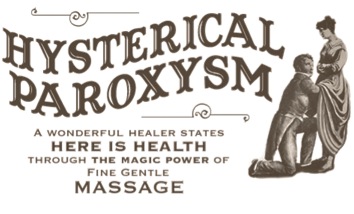We cannot live in a world that is not our own, in a world that is interpreted for us by others. An interpreted world is not a home. – Hildegard of Bingen
[Women Part 3 of 9: 1) Introduction, 2) Bodies, 3) Health, 4) Work, 5) Superwomen, 6) Religion, 7) In Tech, 8) Online 9) Conclusions]
Back in 2001, I wrote a paper based on part of my PhD research about function-structure-behaviour and got to thinking about serendipitous design which is when a happy accident has led to the discovery of a new thing. There are some famous examples like the text message and the post-it note, but, I wanted something different. So, I emailed round asking people, and got back vulcanised rubber, velcro, nylon stockings, mmm different, and then a female psychologist suggested the vibrator. Oh my!
The vibrator, so the story goes, was originally invented to help doctors who had tired hands from giving ‘pelvic massages’ to women to relieve their hysteria, long before it became a tool for pleasure. It does beg the question why did Victorian doctors starting putting their hands up women’s dresses to help with their minds? It reminds me of the time my mother nodded towards the consultant on a ward round who examined her and said: He’s never a doctor.
Older and wiser today, I applaud the psychologist’s creativity and think the vibrator is an extraordinary example of serendipitous design (though designed by men, so phallic shaped which is hardly surprising. Lynne Segal says, even today the language of sex is phallocentric). Back then, I imagined myself at the conference in front of a load of men saying the word vibrator and went with the post-it note instead. Extraordinary example or not, it really wasn’t worth the aggro it could cause in the brain of any excitable male, who unable to see past my female physical form, would assume that me saying vibrator was code for please hit on me later. I mean why else would I be there, except to get me a maaaaan?
I have had many conversations with female academics who work in engineering and computing who have said: I don’t wear peep toe sandals, I don’t wear nail varnish, I don’t wear make-up. They eradicate anything which draws attention away from the smart things they are saying. And yet, I do not know a single male on this earth in any field who has ever felt the need to analyse his appearance in this way for fear that he will not be taken seriously, nor treated with the respect he deserves. Women are constantly subjected to being viewed as little more than objects even in a professional environment when they are there with a job to do. And, there are days, even now, when I feel the way a female cousin said to me once about a man disrespecting her: Somedays you just want to take an iron bar to the idiot and beat that respect out of him.
But, back to Victorian times, when doctors were busy putting their hands up their patients’ dresses and not getting struck off for it, the medical profession (men) believed that they had to keep a woman’s sexuality in check by getting them married and having children, as they believed that celibacy led to insanity.
And, once in that role of wife, the woman was encouraged not to do too much intellectual activity as it diverted the blood to her brain instead of her reproductive organs.
In her book Women, Madness, and Medicine, Denise Russell examines the lives of various writers such as Virginia Woolf and Charlotte Gilman Perkins who were advised to take a rest cure to dispel their creative urges, which were unhealthy. The only creativity they should have been doing was making babies. Motherhood was sold to women, as Marion Shaw puts it in Man Does, Woman Is, as their gift or their duty.
A woman could be an inspirer, but not the inspired; the muse, not the poet; the presence, not the activity. It may be a flattering notion (FOR FIVE MINUTES) but ultimately it was, and is, a dreadful, dreadful lie causing women to be defined from the outside, and to not be defined by themselves, and it still lingers to this day.
Danielle Laporte calls it the Patriarchal Lie of Authority: We know what is best for you and if you don’t do what we say then there is something wrong with you, which I guess is where #mansplaining comes from. How many men have come over to me and explained stuff about things they have no idea? Sometimes a male student will do it during lectures and I think: You have been thinking about this for two weeks under my guidance and I have been thinking about this 20 years, and yet you have to explain something to me. Would you do this if I was a man? And, when we get to assignment time you can guarantee the guy hasn’t really understood, because he wasn’t listening, he was too busy mansplaining.
On this blog, I have spent a lot of time talking about Maslow’s hierarchy of needs, but nowhere on that triangle is there a level which tells you to suck it up, defer to someone else, and do exactly what someone else prescribes is good for you. No! No one knows what is better for you than yourself, so why does society insist on telling women exactly what is good for them, when society itself is so damaged and damaging?
Russell says that there have always been more women than men resident in mental hospitals since the 19th century, because a woman’s role in society is mentally unhealthy and yet women are encouraged to conform to this role because that is how they are socially valued. And still today, many buy into this. There was a great article this week in the Mirror about Louise Rednapp who fell hook, line and sinker for the con trick that domestic goddess breeds domestic goodness. Which sometimes it does. But other times breeds isolation, resentment and frustration, especially when it comes to sacrificing your own self-actualisation to support someone else’s.
Consequently, given the boring and restrictive lives many women led there were many forms of madness and women’s complaints. Once society had done away with healing women – hunted as witches – and the church gave up on the theory that mad people were possessed by the devil, the patriarchy moved into medicine and often conflated medical treatment with morals.
Robert Brudenell Carter studied men’s mental health in the Crimea, but he still had a theory that women were more emotional, had stronger sexual desires, and were hysterical for an audience. It didn’t occur to him, like the men he studied, they were doing something they just didn’t want to do and which wasn’t at all what they thought they had signed up for. His cure for their oppression was marriage. It was imperative to avoid women becoming that female archetype of voracious hunger and sexual insatiability, ‘cos wouldn’t we all be hunting down men for our next shag if we weren’t married? His theory was a ridiculous confusion of medicine and morals, and don’t get me started on the randy old bugger St Augustine and his original sin, just ‘cos he couldn’t keep it in his pants, he had to make it into something outside of himself.
Consequently, poor women or single mothers could be committed. Women who engaged in political activity could be committed. Any deviant behaviour was viewed as illness rather than an unwillingness or inability to fit into an oppressive stereotype and was treated as such and these women would be committed in the name of the patriarchal lie.
And, it is this pathological approach which extended not just to mental health but to physical health and still exists today. Menopause, pregnancy, and menstruation are managed like they are illnesses that we have to get through. They are scheduled and treated with hormones and painkillers with very little celebration of it being a natural process, the cycle of life, and trust in the body. Don’t get me wrong, without the intervention of modern medicine during childbirth I would not be here to tell the tale, nor would my daughters. But, how often have women been dismissed as being hysterical? Or told to come back in a year if it hasn’t sorted itself out? Or told: that pain is not that bad, it will improve after you have kids, from a man who will never experience childbirth nor period pain. And, when I hear men grunting in Bikram like they are about to give birth, I can’t help but wonder like feminist Flo Kennedy, how different the world might be if men were the ones who got pregnant and had kids. Would they remain in a restricted role? Would women go about explaining how things work incorrectly to them? Would they be told to stop whinging and suck it up? Just because a woman can give birth, it doesn’t mean that it is the only thing she can or should do. And, she shouldn’t be told how to live her life.
I can’t find a reference to this, but originally women were barred from the priesthood because of menstruation. How could they possibly hold the sacrament when they were unclean and bleeding? Ironic, given that it is supposed to represent or be (in Roman Catholicism) the body and blood of Christ. It is similar to the idea that women after childbirth weren’t allowed in society until they were ‘churched’ and made ‘clean’ again. Seriously? You can’t make this stuff up. Oh no right, they did.
We live nowadays in a society which publicly embraces equality but in reality does little to effect change because these thoughts and ideas about what a woman should be are so deeply entrenched and institutionalised, that it is going to take a revolution to shake off the subordinate social status of women and to see that women can have their own interpretation of the world, we don’t need the menfolk to explain to us how it all should work. They need to be quiet and listen to who we think we should be in it.
[4) Work]






